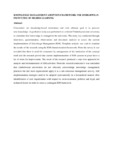Please use this identifier to cite or link to this item:
https://cris.library.msu.ac.zw//handle/11408/1669Full metadata record
| DC Field | Value | Language |
|---|---|---|
| dc.contributor.author | Mutembedza, Amanda N. | - |
| dc.contributor.author | Zhou, Munyaradzi | - |
| dc.contributor.author | Mastara, Paidamoyo | - |
| dc.contributor.author | Giyane, Maxmillan | - |
| dc.contributor.author | Madzikanda, Felex | - |
| dc.contributor.author | Rebanowako, Taurai G. | - |
| dc.contributor.author | Musiiwa, Talent | - |
| dc.date.accessioned | 2016-07-08T09:43:13Z | - |
| dc.date.available | 2016-07-08T09:43:13Z | - |
| dc.date.issued | 2013-10 | - |
| dc.identifier.issn | 2320 -5083 | - |
| dc.identifier.uri | http://hdl.handle.net/11408/1669 | - |
| dc.description.abstract | Universities are knowledge-based institutions and their ultimate goal is to produce new knowledge. A qualitative study was performed at a selected Zimbabwean state university to determine how knowledge is managed in the university. The study was conducted through interviews, questionnaires, observations and document analysis to assess the current implementation of Knowledge Management (KM). Template analysis was used to examine the results of the research using the KM characterization framework. From the survey it was revealed that there is need for awareness by management of the institution of the concept itself and the research proved that current implementations of KM systems in place leave a lot of room for improvement. The result of the research produced a step-wise approach for analysis and implementation of KM activities. From the research conducted it was concluded that Zimbabwean universities do not officially acknowledge knowledge management practices but like most organizations apply it as a sub-conscious management activity. KM implementation strategies need to be adopted systematically in a hierarchical manner after identification of user requirements with respect to socio-economic, political and legal, and technical factors in order to create a contingent KM framework. | en_US |
| dc.language.iso | en | en_US |
| dc.publisher | A GREEN PUBLISHING HOUSE | en_US |
| dc.relation.ispartofseries | Journal of International Academic Research for Multidisciplinary;Vol. 1, No. 9; p. 313-328 | - |
| dc.subject | Knowledge Management, Knowledge, Institution, Framework, Tools | en_US |
| dc.title | Knowledge management adoption framework for Zimbabwean institutes of higher learning | en_US |
| dc.type | Article | en_US |
| item.openairecristype | http://purl.org/coar/resource_type/c_18cf | - |
| item.cerifentitytype | Publications | - |
| item.openairetype | Article | - |
| item.fulltext | With Fulltext | - |
| item.languageiso639-1 | en | - |
| item.grantfulltext | open | - |
| Appears in Collections: | Research Papers | |
Files in This Item:
| File | Description | Size | Format | |
|---|---|---|---|---|
| KNOWLEDGE MANAGEMENT ADOPTION FRAMEWORK FOR ZIMBABWEAN.pdf | Abstract | 5.29 kB | Adobe PDF |  View/Open |
Page view(s)
52
checked on Jul 25, 2024
Download(s)
12
checked on Jul 25, 2024
Google ScholarTM
Check
Items in MSUIR are protected by copyright, with all rights reserved, unless otherwise indicated.



